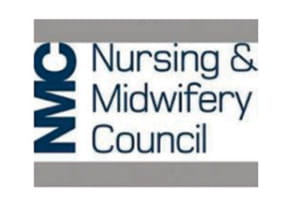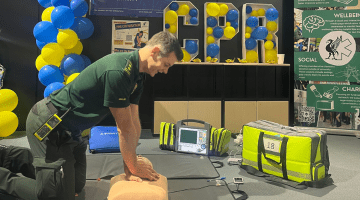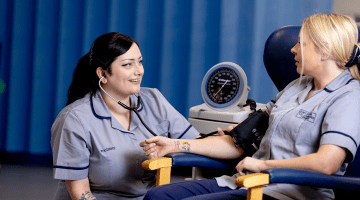Why study this course with LJMU?
- Designed for practicing Nursing Associates to qualify as a Registered Nurse in 18 months.
- Gain a Level 6 Bachelors (BSc) degree while you earn.
- The programme aims to develop Registered Nurses who are accountable, safe, and proficient practitioners who are able to safely deliver holistic person-centred, evidence based and effective care across the lifespan.
- A varied assessment model to support authentic assessments preparing the learner for practice.
- Opportunities to use simulation suites within the university setting to develop practical skills, knowledge and empathy
- 95% of students surveyed said the academic support on our nursing courses was good or very good (National Student Survey 2024)
About your course
The BSc (Hons) Nursing (Mental Health) top up degree apprenticeship supports the learner to achieve a degree while in employment. Providing an NMC approved, quality programme and widening access to higher education.
The programme is delivered over 18 months and is full time.
You will undertake two theoretical assessments in the first six months, and five in the final academic year: one for each theoretical module, in addition to one practice module per year. You will be assessed utilising a variety of authentic assessment methods that will enable you to achieve across a range of assessment styles. You will have access to a variety of digital resources to support your learning and wider experience.
You will be assessed utilising a variety of authentic assessment methods such as presentations, essays, professional conversations, exams and be assessed in clinical practice. This will enable you to achieve across a range of assessment styles. You will have access to a variety of digital resources to support your learning and wider experience.
On successful completion of the programme, you will obtain an Honours Degree and will be able to register with the NMC as a Mental Health Nurse.
If you are a Nursing Associate or Assistant Practitioner your previous qualification may, subject to recognition of prior learning, cover the first 18 months of the BSc (Hons) nursing programme. Do not hesitate to contact us for further information.
This apprenticeship programme is aligned and mapped against the Institute of Apprenticeships and Technical Education (IFATE) Registered Nurse Degree standard ST0781 (IFATE, 2018) and is approved by the Nursing and Midwifery Council.
Course modules
What you will study on this degree
All modules are core modules there are no optional modules in this programme,
Level 5 modules:
- Assessment in (Adult/Child/Mental Health) Nursing
- Complexities in (Adult/Child/Mental Health) Nursing Care
- Developing practice learning
Level 6 modules:
- Person Centred Care Planning
- Leadership and Quality enhancement
- Health economics and health policy
- Managing risk in (Adult/Child/Mental Health) Nursing
- Nursing interventions and prescriber readiness
- Developing practice learning
Further guidance on modules
Modules are designated core or optional in accordance with professional body requirements, as applicable, and LJMU’s Academic Framework Regulations. Whilst you are required to study core modules, optional modules provide you with an element of choice. Their availability may vary and will be subject to meeting minimum student numbers.
Where changes to modules are necessary these will be communicated as appropriate.
Core modules
Assessment in Mental Health Nursing
20 credits
20 credits
This module will develop your understanding of assessing, monitoring and planning care in Mental Health nursing. You will also explore research methods and ethics and the application of an evidence-base to your practice. In this module the indicative content will specifically be applied within the context of Mental Health Nursing.
Complexities in Mental Health Nursing Care
20 credits
20 credits
This module aims to develop your critical understanding of the complexities of providing care including at the end of end of life.
Developing Practice Learning
20 credits
20 credits
The aim of this module is to support students in achieving proficiencies for registered nurses that are aligned to Part 2 of the Practice Assessment Document. In addition, students will be directed and supported to develop an understanding of the theory that underpins the NMC Standards of Proficiency Annexe B Nursing Procedures.
Core modules
Leadership and Quality Enhancement
20 credits
20 credits
This module will equip the learner with the underpinning knowledge required for leading and managing care, including delegation and supporting staff. They will also develop skills to monitor risk and evaluate and enhance quality of care.
Health Economics and Health Policy
20 credits
20 credits
This module will enhance the students understanding of health legislation and current health and social care policies and their influence quality of care, patient safety. They will also develop an understand of the principles of health economics and their relevance to resource allocation in health and social care organisations .
Nursing Interventions and Prescriber Readiness
20 credits
20 credits
This module explores the nurse's role in the instigation of appropriate investigations and interventions when meeting individual care needs. This module will prepare you to progress to a prescribing qualification following registration.
Managing Risk in Mental Health Nursing
20 credits
20 credits
This module will enable you to understand the concept of risk and to identify and appropriately respond to risk within individuals and organisations in adult nursing. In this module the indicative content will specifically be applied within the context of Mental Health Nursing.
Person Centred Care Planning in Mental Health Nursing
20 credits
20 credits
This module will explore decision making within the context of individualised care in mental health nursing. In this module the indicative content will specifically be applied within the context of Mental Health Nursing.
Consolidating Practice Learning
20 credits
20 credits
The aim of this module is to support students in achieving proficiencies for registered nurses that are aligned to Part 3 of the Practice Assessment Document. In addition, students will be directed and supported to develop an understanding of the theory that underpins the NMC Standards of Proficiency Annexe B Nursing Procedures.
Professional accreditation/links
This programme is accredited by the Nursing and Midwifery Council (NMC) and aligned to the Standards for pre-registration nursing programmes (NMC, 2023).

Your Learning Experience
Excellent facilities and learning resources
The programme utilises a variety of teaching and learning approaches that are designed to engage and inspire apprentice learners. These include lectures, seminars, group work activities, simulation and tutorials. LJMU’s Learning and Teaching Strategy 2023-2030 has guided the programme delivery to ensure that learners develop and utilise progressively higher level academic skills throughout the modules, as well as subject specific knowledge and skills as they become inquiring and confident apprenticeship learners.
The range of learning and teaching strategies that are applied across the programme seek to develop and foster independence in the acquisition of knowledge and facilitate the application of theoretical knowledge. Learners will therefore:
- Be enabled in acquiring knowledge through supported on-the-job learning. This will include being directed to scholarly activities that will prepare them for scheduled teaching activity that is provided directly by members of staff in real time, either face-to-face or synchronous online. This may take the form of lectures, seminars, tutorials and webcasts.
- Be supported in engaging in online asynchronous activity. Examples include asynchronous tutorial discussions, tutor-facilitated discussion boards, and tutor-facilitated collaborative or individual projects such as wikis, padlets, blogs and e-portfolios. While they may not be present at the same times as the learners, academic staff actively, iteratively, and directly engage with learners to facilitate and guide learning, and are visible, engaged and active in the virtual learning environment and will contain an activity which contributes towards the development of the Knowledge Skills and Behaviours (KSB’s).
- Consolidate theoretical learning in the practice learning environment whilst being supported and assessed by practice supervisors and assessors and academic assessors as per the requirements of the NMC Standards for Supervision and Assessment (2023).
Dedicated personal tutor, plus study skills support
All apprentice learners will commence their programme of study with a timetabled induction period. The primary purpose of this induction period will be to foster a sense of community and identity and to enhance their readiness and develop peer support networks for learning before the programmes begin. The importance of group support and the availability of a range of university-wide support services for all apprentice learners will ensure that individuals are aware of the diverse range of support mechanisms available to them for the duration of their programme and beyond. This includes health and wellbeing services, learning support and the careers service who can support their transition into employability and professional life.
LJMU has a range of support mechanisms that support apprentice learners in making the transition to higher education and subsequently across academic levels of study. At programme level, transition to subsequent years of study will commence prior to the end of the previous year. Specifically, there will be a focus on empowering apprentice learners to identify their own individual needs relating to both theory and practice. The academic assessor, personal and tripartite tutor will be key to the transition process in offering both academic and pastoral support and helping apprentice learners to identify their individual goals for the forthcoming year.
Apprentice learners have access to the programme team, Personal Tutors, Practice Supervisors, Practice Assessors, Academic Assessors, Cohort Leads and Lecturers in Practice Learning for guidance in their learning throughout the course of their programme. Working together, in their distinct roles this team provide a coherent structure of support with open channels of communication, to provide support and help apprentice learners achieve in both theory and practice.
Assessment varies depending on the modules you choose, but will usually include a combination of exams and coursework.
Learners will usually undertake one assessment for every theoretical module. Assessment methods will be authentic to practice to demonstrate knowledge and competency, and replicate or further advance of ‘real-world’ tasks that learners are expected to experience in their professional careers.
Formative assessment will take place both within the theoretical module delivery and learning environment. To prepare for theoretical assessment apprentice learners will be given the opportunity to practice the appropriate
skills that relate to the variety of assessment methods that are utilised throughout the programme. This will enable them to adequately prepare for written, verbal, practical and examination forms of assessment in each year of
study.
Where you will study
The School of Nursing and Advanced Practice is based within Tithebarn Building.
Course tutors

Sharon Riverol
Programme Lead
Sharon has been in post at LJMU since October 2020 and a registered nurse from 05.2005. Sharon was worked in a variety settings including Stroke rehabilitation, Coronary Care Unit, Acute Medical Unit and General Practice. Roles have included junior/ senior nurse, deputy ward manager, nurse manager. Sharon came to LJMU to complete her masters in advanced healthcare practice and then worked as an ANP before joining LJMU as a lecturer. Sharon become programme leader following involvement with the trainee nursing associate programme at LJMU, her interests include widening participation and support for learners. She enjoys teaching and running the apprentice workshop days as well as actively engaging with the employers to support learners.
-
 Lecturer/ Senior Lecturer
Lecturer/ Senior Lecturer
Career paths
Employability and career development
Employability within the context of nursing practice allows the preparation for the apprentice learner to develop their career progression whilst undertaking full time work within a healthcare environment that is subject to continual change, challenging environments, different models of care delivery, shifting demographics, innovation, and rapidly evolving technologies. Increasing integration of health and social care services will require nurses to negotiate boundaries and play a proactive role in interdisciplinary teams. The confidence and ability to apply knowledge and skills, and provide, evidence-based, direct nursing care therefore lies at the centre of all nursing practice and these components will be developed as students' progress through their programme.
Student Futures - Careers, Employability and Enterprise Service
A wide range of opportunities and support is available to you, within and beyond your course, to ensure our students experience a transformation in their career trajectory. Every undergraduate curriculum includes Future Focus during Level 4, an e-learning resource and workshop designed to help you to develop your talents, passion and purpose.
Every student has access to Careers Zone 24/7, LJMU's suite of online Apps, resources and jobs board via the LJMU Student Futures website.
Tuition fees and funding
N/A
Entry requirements
Please choose your qualifications below to view requirements
Grades/points required from qualifications:
Work out how many UCAS points your qualifications are worth by visiting the UCAS Tariff Calculator.
Qualification requirements
GCSEs and equivalents
- A minimum of two GCSE's which must include Maths and English at grade C (level 4-9) or above OR level 2 Equivalency in Numeracy and Literacy.
Alternative qualifications considered
Advanced standing from a FdSc Nursing Associate Programme.
Applicants to this programme will need to demonstrate they have met the following learning outcomes via prior certificated study to the value of 120 level 4 credits and 60 level 5 credits.
Level L01 Apply a critical understanding and application of the knowledge, skills and proficiencies outlined in NMC Standards of proficiency for Nursing Associates.
LEVEL L02 Demonstrate competency in delivery of key proficiencies, meeting the health needs across the lifespan as outlined in NMC Standards of proficiency for Nursing Associates.
LEVEL L03 Display the ability to work effectively within the limits of their knowledge, the boundaries of professional Nursing Associate practice in the delivery of professional compassionate care.
LEVEL L04 Apply understanding and evaluation of evidence-based Nursing Associate practice in the delivery and monitoring of safe care provision.
LEVEL L05 Utilise effective communication skills with service users, families, and the care delivery team to facilitate the delivery of holistic care, which is non-judgemental, inclusive and promotes equality.
LEVEL L06 Effectively use skills for employment that include professional written & spoken communication; numeracy skills and digital capability and team working and collaboration.
LEVEL L07 Demonstrate skills of a reflective practitioner with the ability to engage in life- long learning.
Additional requirements
-
Interview required
An interview will be conducted involving the prospective learner and the employer prior to offering a place on the programme.
Further information
- DBS, Occupational Health requirements
-
RPL
Recognition of prior learning that is capable of being mapped to the Standards of proficiency for registered nurses and programme outcomes, up to a maximum of 50 percent of the programme, is permitted (NMC Standards for pre-registration nursing programmes, 2023: 1.5).
International requirements
Other international requirements
Evidence of proof of equivalency from UK ENIC can be used where an individual has an international qualification. To access the apprenticeship, the individual must have a valid and eligible status. Non-UK nationals are eligible for funding if they have been resident in the UK for at least the previous three year period on the first day of the apprenticeship.
Further information
- DBS, Occupational Health requirements
-
RPL
Recognition of prior learning that is capable of being mapped to the Standards of proficiency for registered nurses and programme outcomes, up to a maximum of 50 percent of the programme, is permitted (NMC Standards for pre-registration nursing programmes, 2023: 1.5).
How to apply
Securing your place at LJMU
To apply for this programme, you are required to complete an LJMU Degree Apprenticeship form. You will need to provide details of previous qualifications and a personal statement outlining why you wish to study this programme.
Your university life
From accommodation and academic support to clubs and societies. Find out what LJMU has to offer.
Talk to our students
Connect with a current LJMU student for advice and guidance on university life, courses and more.
See what our students are saying
At LJMU we want you to know you're making the right choice by studying with us. You can see what our students are saying about their experience with us through their reviews on the following websites:
Related Links
News and views
Browse through the latest news and stories from the university

.png)








The university reserves the right to withdraw or make alterations to a course and facilities if necessary; this may be because such changes are deemed to be beneficial to students, are minor in nature and unlikely to impact negatively upon students or become necessary due to circumstances beyond the control of the university. Where this does happen, the university operates a policy of consultation, advice and support to all enrolled students affected by the proposed change to their course or module.
Further information on the terms and conditions of any offer made, our admissions policy and the complaints and appeals process.




